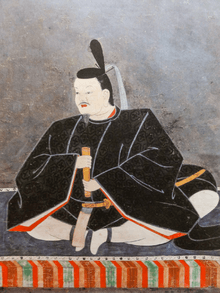Maeda Toshitsune
Maeda Toshitsune (前田 利常, January 16, 1594 – November 7, 1658) was an early-Edo period Japanese samurai, and the 2nd daimyō of Kaga Domain in the Hokuriku region of Japan, and the 3rd hereditary chieftain of the Maeda clan. Toshitsune was a brother of Maeda Toshinaga and a son of Maeda Toshiie. He was the wealthiest daimyō within the Tokugawa shogunate, and his domain encompassed Etchū, Kaga, and Noto provinces. His childhood name was Saruchiyo (猿千代) later "Inuchiyo" (犬千代).
Maeda Toshitsune | |
|---|---|
前田利常 | |
 Portrait of Maeda Toshitsune | |
| Lord of Kaga | |
| In office 1605–1639 | |
| Preceded by | Maeda Toshinaga |
| Succeeded by | Maeda Mitsutaka |
| Personal details | |
| Born | January 16, 1594 |
| Died | November 7, 1658 (aged 64) |
| Nationality | Japanese |
| Father | Maeda Toshiie |
Toshitsune was the fourth son of Maeda Toshiie, and was born to a concubine when Toshiie was aged 54 and was on campaign with Toyotomi Hideyoshi at Nagoya Castle during the Japanese invasion of Korea. He was largely raised by a retainer, Maeda Nagatane and was initially called Toshimitsu (利光). In 1600 he married Tama-hime, a daughter of Tokugawa Hidetada in a political marriage intended to secure the position of the Maeda clan with the growing power of the Tokugawa. In 1605, his elder brother Maeda Toshinaga officially retired, and appointed Toshitsune as his heir and daimyō of Kaga Domain; however, Toshinaga continued to control the domain until his death. In 1614 and 1615, Toshitsune led the Maeda army at the Siege of Osaka, forming one of the largest components of the Tokugawa forces. After the final defeat of the Toyotomi clan, Tokugawa Ieyasu offered the Maeda clan the four provinces of Shikoku island in exchange for their existing three provinces in the Hokuriku region, but Toshitsune declined.
In 1616, Toshitsune met with a diplomatic mission from Ayutthaya in Kanazawa, which due to the death of Tokugawa Ieyasu was not allowed to continue on to Edo.[1]
He changed his name to Toshitsune in 1629. As Toshitsune, daimyō Toshitsune worked to allay fears by the Tokugawa shogunate of Kaga Domain's size and economic strength. He kept his son and heir Maeda Mitsutaka in Edo has a potential hostage, and arranged a political marriage of his son to a daughter of Tokugawa Yorinobu of Mito Domain. He retired in 1639, relocating to Komatsu and ordered that the domain be divided, with 100,000 koku going to his younger son Maeda Toshitsugu to form Toyama Domain, 70,000 koku going go his third son, Maeda Toshiharu to form Daishōji Domain, and 200,000 koku to support his own retirement. He died in 1658 at the age of 64, and his grave is at the Maeda cemetery at Nodayama in Kanazawa.
Family
- Father: Maeda Toshiie (1539–1599)
- Mother: Kinsein
- Wife: Tokugawa Tamahime (1599 – 1622), daughter of Tokugawa Hidetada and Asai Oeyo
- Concubines:
- Okowa no Kata
- Okuri no Kata
- Gojo-no-Tsubone
- Kyogoku no kata
- Fukusho-in
- Children:
- Kametsuruhime (1613-1630) married Mori Tadahiro by Tamahime
- Maeda Mitsutaka by Tamahime
- Kohime (1616-1617) by Tamahime
- Maeda Toshitsugu (1617 – 1674) by Tamahime
- Maeda Toshiharu (1618 – 1660) by Tamahime
- Manhime (1620-1700) married Asano Mitsuakira by Tamahime
- Tomihime (1621-1662) married Prince Hachijō Toshitada by Tamahime
- Natsuhime (1622-1623) by Tamahime
- Haruhime (1631-1650) married Honda Masanaga by Okowa no Kata
- Maeda Toshiaki (1638-1692) by Okuri no Kata
- Ryumaru (1648-1651) by Kyogoku no kata
- Matsuhime (1648-1666) married Matsudaira Sadashige by Gojo-no-Tsubone
- Ryuhime (1650-1654) by Gojo-no-Tsubone
- Kumahime (1652-1715) married Hoshina Masatsune by Fukusho-in
References
- Papinot, Edmond. (1948). Historical and Geographical Dictionary of Japan. New York: Overbeck Co.
- Cesare Polenghi, Samurai of Ayutthaya: Yamada Nagamasa, Japanese warrior and merchant in early seventeenth-century Siam. Bangkok: White Lotus Press (2009), page 41
External links
- Kaga Domain on "Edo 300 HTML" (3 November 2007) (in Japanese)
| Preceded by Maeda Toshinaga |
(Maeda) 1605–1639 |
Succeeded by Maeda Mitsutaka |